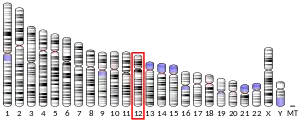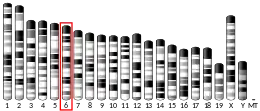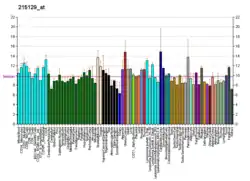PIK3C2G
Phosphatidylinositol-4-phosphate 3-kinase C2 domain-containing gamma polypeptide is an enzyme that in humans is encoded by the PIK3C2G gene.[5][6]
The protein encoded by this gene belongs to the phosphoinositide 3-kinase (PI3K) family. PI3-kinases play roles in signaling pathways involved in cell proliferation, oncogenic transformation, cell survival, cell migration, and intracellular protein trafficking. This protein contains a lipid kinase catalytic domain as well as a C-terminal C2 domain, a characteristic of class II PI3-kinases. C2 domains act as calcium-dependent phospholipid binding motifs that mediate translocation of proteins to membranes, and may also mediate protein-protein interactions. The biological function of this gene has not yet been determined.[6]
References
- GRCh38: Ensembl release 89: ENSG00000139144 - Ensembl, May 2017
- GRCm38: Ensembl release 89: ENSMUSG00000030228 - Ensembl, May 2017
- "Human PubMed Reference:". National Center for Biotechnology Information, U.S. National Library of Medicine.
- "Mouse PubMed Reference:". National Center for Biotechnology Information, U.S. National Library of Medicine.
- Rozycka M, Lu YJ, Brown RA, Lau MR, Shipley JM, Fry MJ (Feb 1999). "cDNA cloning of a third human C2-domain-containing class II phosphoinositide 3-kinase, PI3K-C2gamma, and chromosomal assignment of this gene (PIK3C2G) to 12p12". Genomics. 54 (3): 569–74. doi:10.1006/geno.1998.5621. PMID 9878262.
- "Entrez Gene: PIK3C2G phosphoinositide-3-kinase, class 2, gamma polypeptide".
Further reading
- Lee C, Liu QH, Tomkowicz B, et al. (2004). "Macrophage activation through CCR5- and CXCR4-mediated gp120-elicited signaling pathways". J. Leukoc. Biol. 74 (5): 676–82. doi:10.1189/jlb.0503206. PMID 12960231. S2CID 11362623.
- Milani D, Mazzoni M, Borgatti P, et al. (1996). "Extracellular human immunodeficiency virus type-1 Tat protein activates phosphatidylinositol 3-kinase in PC12 neuronal cells". J. Biol. Chem. 271 (38): 22961–4. doi:10.1074/jbc.271.38.22961. PMID 8798481.
- Mazerolles F, Barbat C, Fischer A (1997). "Down-regulation of LFA-1-mediated T cell adhesion induced by the HIV envelope glycoprotein gp160 requires phosphatidylinositol-3-kinase activity". Eur. J. Immunol. 27 (9): 2457–65. doi:10.1002/eji.1830270946. PMID 9341793.
- Borgatti P, Zauli G, Colamussi ML, et al. (1998). "Extracellular HIV-1 Tat protein activates phosphatidylinositol 3- and Akt/PKB kinases in CD4+ T lymphoblastoid Jurkat cells". Eur. J. Immunol. 27 (11): 2805–11. doi:10.1002/eji.1830271110. PMID 9394803.
- Borgatti P, Zauli G, Cantley LC, Capitani S (1998). "Extracellular HIV-1 Tat protein induces a rapid and selective activation of protein kinase C (PKC)-alpha, and -epsilon and -zeta isoforms in PC12 cells". Biochem. Biophys. Res. Commun. 242 (2): 332–7. doi:10.1006/bbrc.1997.7877. PMID 9446795.
- Misawa H, Ohtsubo M, Copeland NG, et al. (1998). "Cloning and characterization of a novel class II phosphoinositide 3-kinase containing C2 domain". Biochem. Biophys. Res. Commun. 244 (2): 531–9. doi:10.1006/bbrc.1998.8294. PMID 9514948.
- Ono F, Nakagawa T, Saito S, et al. (1998). "A novel class II phosphoinositide 3-kinase predominantly expressed in the liver and its enhanced expression during liver regeneration". J. Biol. Chem. 273 (13): 7731–6. doi:10.1074/jbc.273.13.7731. PMID 9516481.
- Milani D, Mazzoni M, Zauli G, et al. (1998). "HIV-1 Tat induces tyrosine phosphorylation of p125FAK and its association with phosphoinositide 3-kinase in PC12 cells". AIDS. 12 (11): 1275–84. doi:10.1097/00002030-199811000-00008. PMID 9708406. S2CID 25758704.
- Jauliac S, Mazerolles F, Jabado N, et al. (1998). "Ligands of CD4 inhibit the association of phospholipase Cgamma1 with phosphoinositide 3 kinase in T cells: regulation of this association by the phosphoinositide 3 kinase activity". Eur. J. Immunol. 28 (10): 3183–91. doi:10.1002/(SICI)1521-4141(199810)28:10<3183::AID-IMMU3183>3.0.CO;2-A. PMID 9808187.
- Park IW, Wang JF, Groopman JE (2001). "HIV-1 Tat promotes monocyte chemoattractant protein-1 secretion followed by transmigration of monocytes". Blood. 97 (2): 352–8. doi:10.1182/blood.V97.2.352. PMID 11154208.
- Zauli G, Milani D, Mirandola P, et al. (2001). "HIV-1 Tat protein down-regulates CREB transcription factor expression in PC12 neuronal cells through a phosphatidylinositol 3-kinase/AKT/cyclic nucleoside phosphodiesterase pathway". FASEB J. 15 (2): 483–91. doi:10.1096/fj.00-0354com. PMID 11156964. S2CID 26315564.
- Deregibus MC, Cantaluppi V, Doublier S, et al. (2002). "HIV-1-Tat protein activates phosphatidylinositol 3-kinase/ AKT-dependent survival pathways in Kaposi's sarcoma cells". J. Biol. Chem. 277 (28): 25195–202. doi:10.1074/jbc.M200921200. PMID 11994280.
- Cook JA, August A, Henderson AJ (2002). "Recruitment of phosphatidylinositol 3-kinase to CD28 inhibits HIV transcription by a Tat-dependent mechanism". J. Immunol. 169 (1): 254–60. doi:10.4049/jimmunol.169.1.254. PMID 12077252.
- François F, Klotman ME (2003). "Phosphatidylinositol 3-Kinase Regulates Human Immunodeficiency Virus Type 1 Replication following Viral Entry in Primary CD4+ T Lymphocytes and Macrophages". J. Virol. 77 (4): 2539–49. doi:10.1128/JVI.77.4.2539-2549.2003. PMC 141101. PMID 12551992.
- Khan NA, Di Cello F, Nath A, Kim KS (2004). "Human immunodeficiency virus type 1 tat-mediated cytotoxicity of human brain microvascular endothelial cells". J. Neurovirol. 9 (6): 584–93. doi:10.1080/jnv.9.6.584.593. PMID 14602571.
- Langford D, Hurford R, Hashimoto M, et al. (2006). "Signalling crosstalk in FGF2-mediated protection of endothelial cells from HIV-gp120". BMC Neuroscience. 6: 8. doi:10.1186/1471-2202-6-8. PMC 549045. PMID 15689238.
- Lee C, Tomkowicz B, Freedman BD, Collman RG (2006). "HIV-1 gp120-induced TNF-{alpha} production by primary human macrophages is mediated by phosphatidylinositol-3 (PI-3) kinase and mitogen-activated protein (MAP) kinase pathways". J. Leukoc. Biol. 78 (4): 1016–23. doi:10.1189/jlb.0105056. PMID 16081599. S2CID 7628860.
- Anand AR, Ganju RK (2006). "HIV-1 gp120-mediated apoptosis of T cells is regulated by the membrane tyrosine phosphatase CD45". J. Biol. Chem. 281 (18): 12289–99. doi:10.1074/jbc.M511786200. PMID 16524887.




